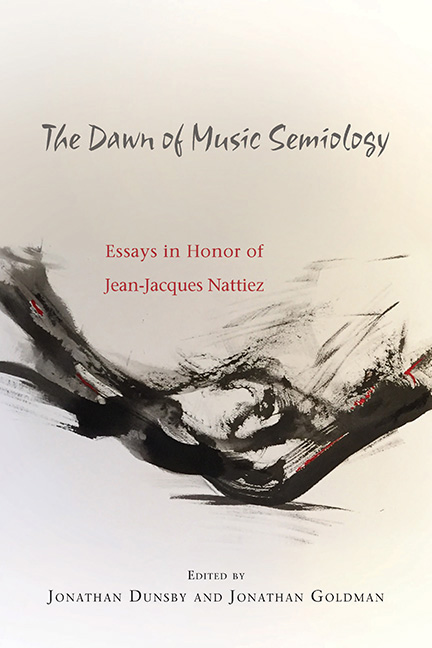Book contents
- Frontmatter
- Contents
- Foreword: About Jean-Jacques Nattiez
- Acknowledgments
- Introduction
- Part One Metaconsiderations
- Part Two Poietic Channels
- 4 From Georgian to Medieval Polyphonies: Analysis and Modeling
- 5 Schenker's Inhalt, Schenkerian Semiotics: A Preliminary Study
- 6 Music under the Sign of Modernism: From Wagner to Boulez, and Britten
- Part Three Esthesic Excursions
- Selected Bibliography of Works by Jean-Jacques Nattiez
- List of Contributors
- Index
- Tabula Gratulatoria
5 - Schenker's Inhalt, Schenkerian Semiotics: A Preliminary Study
from Part Two - Poietic Channels
Published online by Cambridge University Press: 26 April 2018
- Frontmatter
- Contents
- Foreword: About Jean-Jacques Nattiez
- Acknowledgments
- Introduction
- Part One Metaconsiderations
- Part Two Poietic Channels
- 4 From Georgian to Medieval Polyphonies: Analysis and Modeling
- 5 Schenker's Inhalt, Schenkerian Semiotics: A Preliminary Study
- 6 Music under the Sign of Modernism: From Wagner to Boulez, and Britten
- Part Three Esthesic Excursions
- Selected Bibliography of Works by Jean-Jacques Nattiez
- List of Contributors
- Index
- Tabula Gratulatoria
Summary
Schenker's monograph on Beethoven's Ninth Symphony, published in 1912, may have been one of his most successful writings and probably was the most influential one in its own time. Its influence on Wilhelm Furtwangler, who read the book in 1913; on Bernard Paumgartner, who reviewed it in Heimgarten in 1914; on Paul von Klenau, who directed the performance of the Symphony for the centenary of its premiere in Vienna in 1924; and on many others is well known. The full title reads: Beethovens neunte Sinfonie. Eine Darstellung des musikalischen Inhaltes unter fortlaufender Berücksichtigung auch des Vortrages und der Literatur; that is: Beethoven's Ninth Symphony. A Presentation of the Musical Content under Ongoing Consideration of Both the Performance and the Literature. As Nicholas Cook describes it, Schenker's basic purpose in this book “is to refute the whole edifice of Wagnerian interpretation, and to reclaim the work for what [he] calls ‘absolute music.’ … Schenker's attempt to show how everything in the Ninth Symphony, even its finale, can be explained in purely musical terms is therefore an accurately targeted assault on the central stronghold of the Wagnerian aesthetic.” Cook further comments on the contrast between the descriptions of the Ninth, especially of the Finale, by Schenker on one side and by Wagner (and Kretzschmar) on the other. Schenker indeed violently criticizes the “outrageous passion” with which Wagner “defends the idea of a pretended progress on the basis of the overcoming of absolute music, drawn from his own misunderstandings.”
But Schenker's more precise purpose, as mentioned both in the title and throughout the book, is to describe the “musical content” of the symphony, which does not appear of much concern to Wagner, at least in his program note of 1846. Wagner writes that instrumental music expresses what cannot be formulated in words, and proposes “words,” taken from Goethe's Faust, to express the moods underlying the music:
It must be granted from the outset that the essence of the higher instrumental music consists specifically in expressing in musical sound what is inexpressible in words. Even so we believe we may approach here, albeit only through suggestion, the solution to an unachievable task by summoning to our aid the words of our great poet Goethe.
- Type
- Chapter
- Information
- The Dawn of Music SemiologyEssays in Honor of Jean-Jacques Nattiez, pp. 81 - 96Publisher: Boydell & BrewerPrint publication year: 2017



